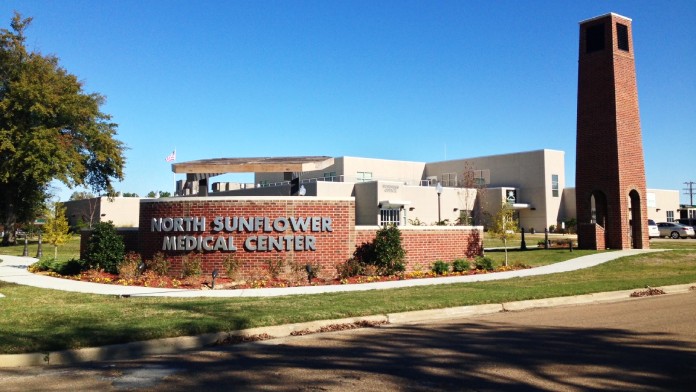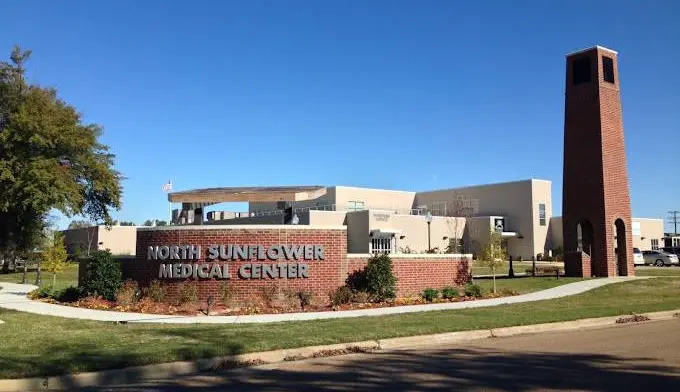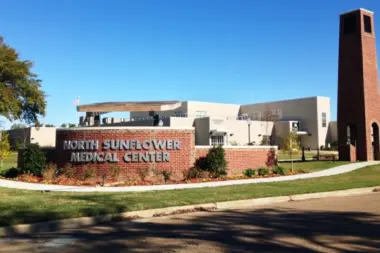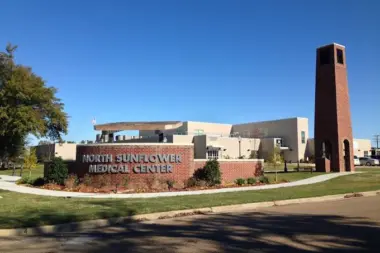The place is nice, spacious, with very good green facilities to clear your mind of your problems and addictions.
About North Sunflower Medical Center
North Sunflower Medical Center offers multiple levels of care to align with clients’ evolving needs. Clients receive medical and mental health assessments and personalized care planning to determine the appropriate treatment modalities.
The inpatient program provides high-level structure and support for clients requiring round-the-clock supervision and clinical or psychiatric stabilization. Clients may be prescribed FDA-approved medications to ease withdrawal symptoms and prevent complications. Clients also engage in intensive individual, group, and family counseling and robust, age-specific, recovery-focused life skills training addressing topics such as coping and relapse prevention.
Their outpatient programs are designed for adults aged 18 and over and include continuing counseling and recovery education. Their most intensive outpatient program encompasses three hours of treatment for up to four days per week. Private transportation, meals, and social and recreational activities are provided. Their aftercare services ensure a complete continuum of care and may include step-down support and referrals for additional medical, mental health, and social service programs.
North Sunflower Medical Center accepts most major insurance plans, including TRICARE, Medicare, Medicaid, Anthem, Aetna, Cigna, and BlueCross/BlueShield. Please check with your provider to verify coverage, as out of network benefits may vary. Financial assistance is available.
Latest Reviews
Rehab Score
Gallery




Accepted Insurance
Other Forms of Payment
Private insurance refers to any kind of healthcare coverage that isn't from the state or federal government. This includes individual and family plans offered by an employer or purchased from the Insurance Marketplace. Every plan will have different requirements and out of pocket costs so be sure to get the full details before you start treatment.
Financial aid can take many forms. Centers may have grants or scholarships available to clients who meet eligibility requirements. Programs that receive SAMHSA grants may have financial aid available for those who need treatment as well. Grants and scholarships can help you pai for treatment without having to repay.
Medicare is a federal program that provides health insurance for those 65 and older. It also serves people under 65 with chronic and disabling health challenges. To use Medicare for addiction treatment you need to find a program that accepts Medicare and is in network with your plan. Out of pocket costs and preauthorization requirements vary, so always check with your provider.
Medicaid is a state based program that helps lower-income individuals and families pay for healthcare. Medicaid covers addiction treatment so those enrolled can use their coverage to pay for rehab. When a program accepts Medicaid the client often pays very little or nothing out of their own pocket.
Military members, veterans, and eligible dependents have access to specific insurance programs that help them get the care they need. TRICARE and VA insurance can help you access low cost or no cost addiction and mental health treatment. Programs that accept military insurance often have targeted treatment focused on the unique challenges military members, veterans, and their families face.
Addiction Treatments
Levels of Care
Clients stepping down from inpatient care or who prefer to remain at home while receiving intensive treatment may choose to enroll in an outpatient rehab. Outpatient day treatment, partial hospitalization (PHP), and intensive outpatient programs (IOP) are designed for clients requiring more robust supervision and daily treatment. Standard outpatient services enable clients to attend addiction counseling and recovery education throughout the week, with many centers offering weekend, night, and evening sessions to accommodate clients' work and family schedules.
Residential treatment programs are those that offer housing and meals in addition to substance abuse treatment. Rehab facilities that offer residential treatment allow patients to focus solely on recovery, in an environment totally separate from their lives. Some rehab centers specialize in short-term residential treatment (a few days to a week or two), while others solely provide treatment on a long-term basis (several weeks to months). Some offer both, and tailor treatment to the patient's individual requirements.
Clients in an intensive outpatient program (IOP) require substantive support as they prepare to transition into standard outpatient (OP) care or community-based recovery programs, such as AA. Most IOP clients are in early recovery or are at an elevated relapse risk. Intensive outpatient treatment generally involves multiple, extended sessions weekly. Many programs require clients to participate in a minimum of nine therapeutic hours weekly. The most common treatment modalities include psychotherapy, recovery education, and medication assisted treatment.
Professional intervention services can help families navigate issues related to planning and executing an intervention in Mississippi. Understanding that heightened emotions and complex family dynamics are present, an intervention specialist helps by organizing and executing the intervention while allowing everyone to express their feelings. They also make sure the addicted loved one feels cared for instead of attacked, and they can also help create treatment plans for the individual and their family members.
During early phases of recovery, 24-hour clinical care in Mississippi provides several advantages that can improve recovery outcomes. First, medical staff can prescribe medications to manage withdrawal. Second, staff are available 24/7 to address mental health issues that arise. Third, any other medical issues can be addressed, such as illness or medication management. Lastly, this intensive level of treatment can provide nutritional care to further improve the individual's health.
Treatments
Many of those suffering from addiction also suffer from mental or emotional illnesses like schizophrenia, bipolar disorder, depression, or anxiety disorders. Rehab and other substance abuse facilities treating those with a dual diagnosis or co-occurring disorder administer psychiatric treatment to address the person's mental health issue in addition to drug and alcohol rehabilitation.
Mental health rehabs focus on helping individuals recover from mental illnesses like bipolar disorder, clinical depression, anxiety disorders, schizophrenia, and more. Mental health professionals at these facilities are trained to understand and treat mental health issues, both in individual and group settings.
Programs
Adult rehab programs include therapies tailored to each client's specific needs, goals, and recovery progress. They are tailored to the specific challenges adult clients may face, including family and work pressures and commitments. From inpatient and residential treatment to various levels of outpatient services, there are many options available. Some facilities also help adults work through co-occurring conditions, like anxiety, that can accompany addiction.
Young adulthood can be an exciting, yet difficult, time of transition. Individuals in their late teens to mid-20s face unique stressors related to school, jobs, families, and social circles, which can lead to a rise in substance use. Rehab centers with dedicated young adult programs will include activities and amenities that cater to this age group, with an emphasis on specialized counseling, peer socialization, and ongoing aftercare.
Serving in the military is both mentally and physically challenging, and can result in trauma that persists even after combat ends. Military programs are tailored to the specific and often complex needs of active duty personnel, veterans, and military families. Clients often access these programs through the U.S. Department of Veterans Affairs (VA).
Clinical Services
Cognitive Behavioral Therapy (CBT) is a therapy modality that focuses on the relationship between one's thoughts, feelings, and behaviors. It is used to establish and allow for healthy responses to thoughts and feelings (instead of unhealthy responses, like using drugs or alcohol). CBT has been proven effective for recovering addicts of all kinds, and is used to strengthen a patient's own self-awareness and ability to self-regulate. CBT allows individuals to monitor their own emotional state, become more adept at communicating with others, and manage stress without needing to engage in substance abuse.
Group therapy is any therapeutic work that happens in a group (not one-on-one). There are a number of different group therapy modalities, including support groups, experiential therapy, psycho-education, and more. Group therapy involves treatment as well as processing interaction between group members.
In individual therapy, a patient meets one-on-one with a trained psychologist or counselor. Therapy is a pivotal part of effective substance abuse treatment, as it often covers root causes of addiction, including challenges faced by the patient in their social, family, and work/school life.
Trauma therapy addresses traumatic incidents from a client's past that are likely affecting their present-day experience. Trauma is often one of the primary triggers and potential causes of addiction, and can stem from child sexual abuse, domestic violence, having a parent with a mental illness, losing one or both parents at a young age, teenage or adult sexual assault, or any number of other factors. The purpose of trauma therapy is to allow a patient to process trauma and move through and past it, with the help of trained and compassionate mental health professionals.
Research clearly demonstrates that recovery is far more successful and sustainable when loved ones like family members participate in rehab and substance abuse treatment. Genetic factors may be at play when it comes to drug and alcohol addiction, as well as mental health issues. Family dynamics often play a critical role in addiction triggers, and if properly educated, family members can be a strong source of support when it comes to rehabilitation.
Often, substance use and mental health disorders weaken basic life skills. This makes daily functioning a challenge and can lead to a cycle of addiction. To help you break free from this cycle, drug rehab programs include integrated life skills training which helps you redevelop or strengthen the life skills you need for success.
Recreational therapy is a holistic approach to drug and alcohol addiction treatment in Mississippi. It integrates activities like hiking, art, and team sports to improve your physical fitness and give you an outlet to express your emotions and stress. Recreational therapy helps people who are rebuilding their lives to maintain long term sobriety.
Amenities
-
Residential Setting
-
Private Setting
Contact Information
840 North Oak Avenue
Ruleville MS, 38771




